小学英语四种时态重点及其练习
- 格式:doc
- 大小:51.50 KB
- 文档页数:4
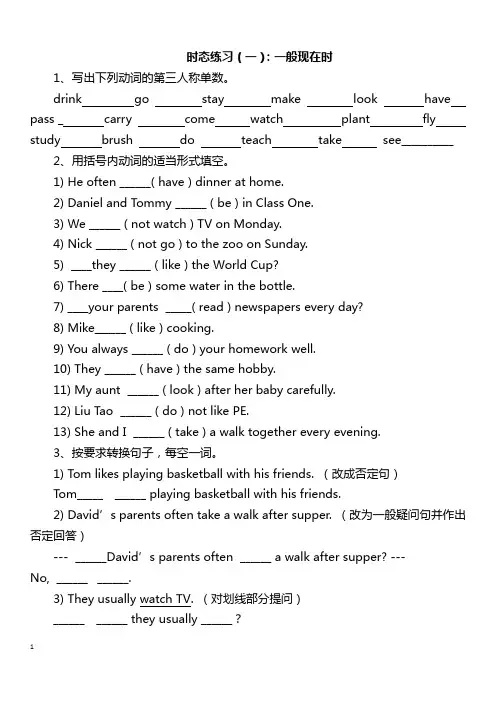
时态练习(一):一般现在时1、写出下列动词的第三人称单数。
drink go stay make look have pass _ carry come watch plant fly study brush do teach take see__________2、用括号内动词的适当形式填空。
1) He often ______( have ) dinner at home.2) Daniel and Tommy ______ ( be ) in Class One.3) We ______ ( not watch ) TV on Monday.4) Nick ______ ( not go ) to the zoo on Sunday.5) ____they ______ ( like ) the World Cup?6) There ____( be ) some water in the bottle.7) ____your parents _____( read ) newspapers every day?8) Mike______ ( like ) cooking.9) You always ______ ( do ) your homework well.10) They ______ ( have ) the same hobby.11) My aunt ______ ( look ) after her baby carefully.12) Liu Tao ______ ( do ) not like PE.13) She and I ______ ( take ) a walk together every evening.3、按要求转换句子,每空一词。
1) Tom likes playing basketball with his friends. (改成否定句)Tom_____ ______ playing basketball with his friends.2) David’s parents often take a walk after supper. (改为一般疑问句并作出否定回答)--- ______David’s parents often ______ a walk after supper? ---No, ______ ______.3) They usually watch TV. (对划线部分提问)______ ______ they usually ______?4)She is always a good student. (改为一般疑问句并作出肯定回答)5)--- ___ ______ always a ______ student? --- ______ , ______ ______ .6)5) Simon and Daniel like going skating. (改为否定句)7)Simon and Daniel ______ ______ going ______.6)Tom does his homework every day.(否定句)Tom_________ ______ his homework every day.7)Alice has got a new comic book as her birthday present.(改为一般疑问句并肯定回答)_________ Alice___________ a new comic book as her birthday presentYes, _______ _________.时态练习(二):一般将来时一、用所给动词的正确形式填空。
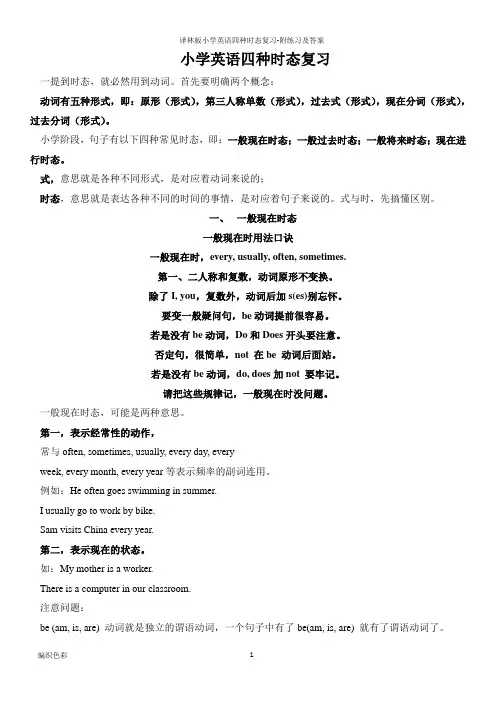
小学英语四种时态复习一提到时态,就必然用到动词。
首先要明确两个概念:动词有五种形式,即:原形(形式),第三人称单数(形式),过去式(形式),现在分词(形式),过去分词(形式)。
小学阶段,句子有以下四种常见时态,即:一般现在时态;一般过去时态;一般将来时态;现在进行时态。
式,意思就是各种不同形式,是对应着动词来说的;时态,意思就是表达各种不同的时间的事情,是对应着句子来说的。
式与时,先搞懂区别。
一、一般现在时态一般现在时用法口诀一般现在时,every, usually, often, sometimes.第一、二人称和复数,动词原形不变换。
除了I, you,复数外,动词后加s(es)别忘怀。
要变一般疑问句,be动词提前很容易。
若是没有be动词,Do和Does开头要注意。
否定句,很简单,not 在be 动词后面站。
若是没有be动词,do, does加not 要牢记。
请把这些规律记,一般现在时没问题。
一般现在时态,可能是两种意思。
第一,表示经常性的动作,常与often, sometimes, usually, every day, everyweek, every month, every year等表示频率的副词连用。
例如:He often goes swimming in summer.I usually go to work by bike.Sam visits China every year.第二,表示现在的状态。
如:My mother is a worker.There is a computer in our classroom.注意问题:be (am, is, are) 动词就是独立的谓语动词,一个句子中有了be(am, is, are) 就有了谓语动词了。
句子中不能同时出现两个谓语动词。
不少同学经常出这样的错误:The boy is often eats hamburgers.(错)应当改为:The boy often eats hamburgers.二、现在进行时态正在进行时态口诀现在分词用途多,进行时态不用说。
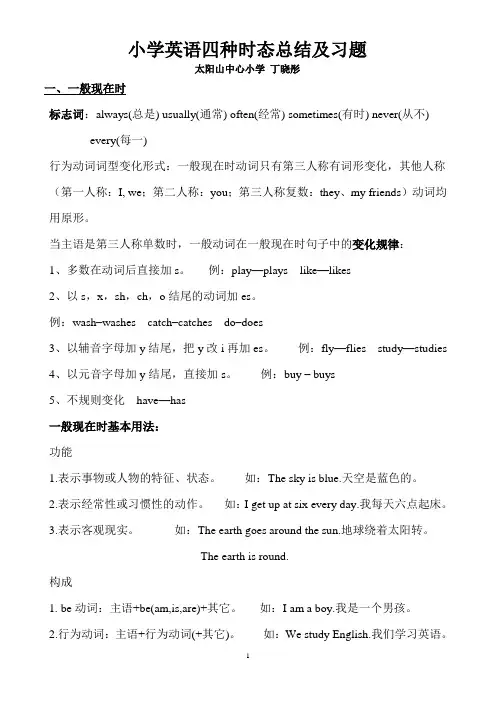
小学英语四种时态总结及习题太阳山中心小学丁晓彤一、一般现在时标志词:always(总是) usually(通常) often(经常) sometimes(有时) never(从不) every(每一)行为动词词型变化形式:一般现在时动词只有第三人称有词形变化,其他人称(第一人称:I, we;第二人称:you;第三人称复数:they、my friends)动词均用原形。
当主语是第三人称单数时,一般动词在一般现在时句子中的变化规律:1、多数在动词后直接加s。
例:play—plays like—likes2、以s,x,sh,ch,o结尾的动词加es。
例:wash–washes catch–catches do–does3、以辅音字母加y结尾,把y改i再加es。
例:fly—flies study—studies4、以元音字母加y结尾,直接加s。
例:buy – buys5、不规则变化have—has一般现在时基本用法:功能1.表示事物或人物的特征、状态。
如:The sky is blue.天空是蓝色的。
2.表示经常性或习惯性的动作。
如:I get up at six every day.我每天六点起床。
3.表示客观现实。
如:The earth goes around the sun.地球绕着太阳转。
The earth is round.构成1. be动词:主语+be(am,is,are)+其它。
如:I am a boy.我是一个男孩。
2.行为动词:主语+行为动词(+其它)。
如:We study English.我们学习英语。
句型肯定句:A. be动词:主语+ be + 其它成分如:He is a worker.B.行为动词:主语+动词(注意人称变化) +其它成分如:We like the little cat.否定句:A. be动词:主语+ be + not +其它成分如:They are not students.B.行为动词:主语+助动词(do/does) + not +动词原形+其它成分如:We don’t like the little cat.一般疑问句:A. be动词:Am / Is /Are +主语+ 其它成分如:Are you a teacher? Yes, I am. / No, I am not.Are they students of your school?Yes they are / No they aren’t.B.行为动词:助动词(Do/Does)+主语+动词原形+ 其它成分如:Do you like it? Yes, I do. / No. I don’t .Does he(she) like it? Yes, he( she )does. / No, he ( s he )doesn’t.特殊疑问句:疑问词+ 一般疑问句A. be动词:How many students are there in your school?B.行为动词:What do you usually do on Sunday?一般现在时动词be和have的变化形式1.动词Be 用法:第一人称单数用am,第三人称单数用is,其它人称用are。
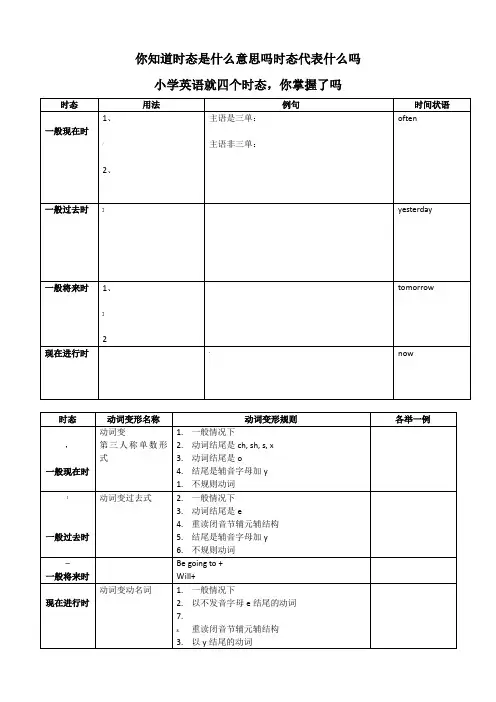
你知道时态是什么意思吗时态代表什么吗小学英语就四个时态,你掌握了吗你能发现它们之间的共同点和不同点吗勤加练习,百战不殆I.把下列动词变为第三人称单数形式。
1. clean--2. go--3. have--4.do-6. fly--7. come-- brush-9. watch-- 10. study-- 11. ask--(13. swim-- 14. catch-- 15. write--16. eat-- 17. make-- 18. paint—19. learn-- 20. phone-- 21. run—22. hop-- 23. sing-- 24. pick—II.把下列动词变成过去式is\am________ fly______ plant________are________ drink_________ play_______go________ make ______ does_________dance________ worry________ ask _____ taste_________ eat__________ draw________put ______ throw________kick_________ pass_______ do ________III.把下列动词变成动名词形式。
Wake________ make__________ come____________have____________!Take_________ leave__________ rid_________, regret__________, Begin________,cut________, get_________, hit_________, run_________, set_________, sit__________, spit__________, stop_________, swim________,beg_________, drop__________, fit_________, nod_________, dig___________, forget_________, travel_________visit_________Carry_________ enjoy___________ play ___________ study ________die_________ lie_________多加练习,百战不殆之时态篇一、用单词的正确形式填空:1.Mike _________ (do) his homework every day.2.There __________(be) some water in the glass.3.We like ________ (play) basketball after class.4.I like singing. I often _________(listen) to the music in the evening.5.【6.My grandma_________(watch) TV every day.二、判断句子的正误, 并改正。
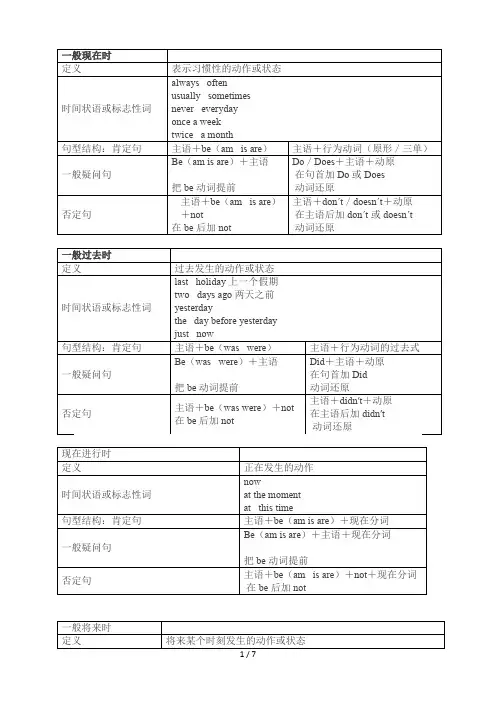
4. 以o结尾的单词: 有生命加s 。
tomato-tomatoespotato-potatoes无生命加espiano-pianosphoto-photoszoo-zoosradio-radios小升初时态专题综合训练1.(成都市青羊区小学毕业卷)John _____ football.A. likes playingB. likes playC. like play2.(深圳市龙岗区小学毕业卷)Does your mother _____ football?A. likeB. likesC. like play3.(芜湖市第三中学招生卷)They usually _____ TV in the evening.A. watchB. will watchC. are watchingD. watches4.(上海市奉贤区小学毕业卷)—What do you usually do on the weekend?—I often ____.A. do my homeworkB. did my homeworkC. doing my homework5. (杭州市西湖区小学毕业卷)I don’t like _____ thril lers(恐怖片)______ playing baseball.A. watching; orB. watching; andC. to watch; or6.(菏泽市晨曦中学招生卷)Bob often _____ to school.A. walkB. walksC. walked7.(南昌铁路一中初中部招生卷)My pen ______ on my desk ten minutes ago.But it _____ there now.A. is; isn’tB. was; isn’tC. is; is8.(长沙市宁乡县小学毕业卷)Mike is _____ after his classmates.A. runsB. runingC. running9.(桂林市奎光学校招生卷)Be quiet! The babies ________.A. sleepB. are sleepingC. slept10. (武汉市青山区小学毕业卷)______ he _____ his homework yesterday?A. Does; doB. Did; didC. Did; do11(北京市朝阳区小学毕业卷)—What did you do last weekend?—I ______.A. go swimmingB. did my homeworkC. went swim12.(芜湖市第十一中学招生卷)—What’s your hobby?—_____ is my hobby.A. Collecting stampsB. Collect stampsC. Stamps13.(广州市白云区小学毕业卷)—Where were you just now?—I _____ at school.A. isB. wasC. were14.(武汉市青山区小学毕业卷)______ he ______ his grandparents lastmonth?A. Did; visitedB. Did; visitC. Do; visited15.(郑州市二七区小学毕业卷)Last week, we _____ a _____ race.A. hard; runningB. have; runningC. had; running16.(福州市仓山区小学毕业卷)I______ to the park last week.A. goB. wentC. going17.(合肥市蜀山区小学毕业卷)If I _____ you tomorrow, I will give youthe receipt(收据)。
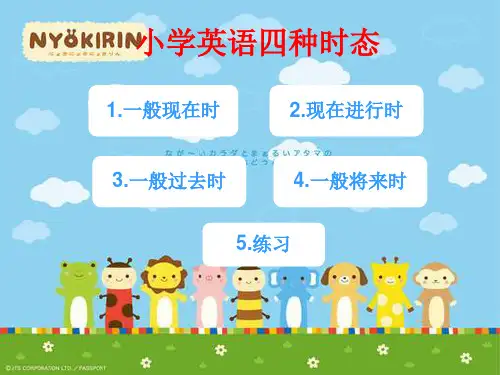
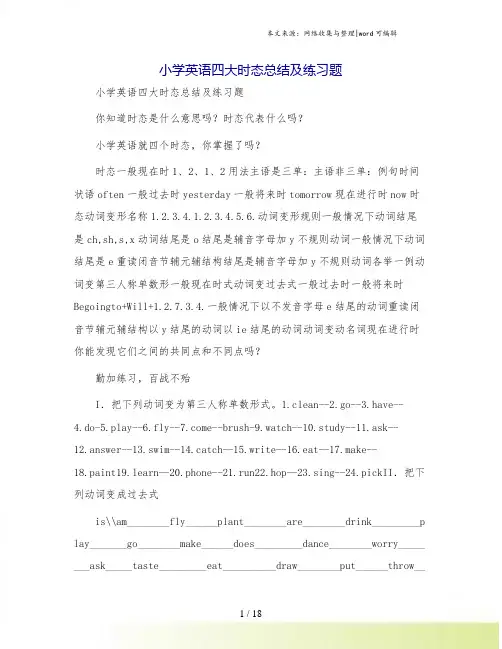
小学英语四大时态总结及练习题小学英语四大时态总结及练习题你知道时态是什么意思吗?时态代表什么吗?小学英语就四个时态,你掌握了吗?时态一般现在时1、2、1、2用法主语是三单:主语非三单:例句时间状语often一般过去时yesterday一般将来时tomorrow现在进行时now时态动词变形名称1.2.3.4.1.2.3.4.5.6.动词变形规则一般情况下动词结尾是ch,sh,s,x动词结尾是o结尾是辅音字母加y不规则动词一般情况下动词结尾是e重读闭音节辅元辅结构结尾是辅音字母加y不规则动词各举一例动词变第三人称单数形一般现在时式动词变过去式一般过去时一般将来时Begoingto+Will+1.2.7.3.4.一般情况下以不发音字母e结尾的动词重读闭音节辅元辅结构以y结尾的动词以ie结尾的动词动词变动名词现在进行时你能发现它们之间的共同点和不同点吗?勤加练习,百战不殆I.把下列动词变为第三人称单数形式。
1.clean--2.go--3.have--4.do-5.play--6.fly--e--brush-9.watch--10.study--11.ask--12.answer--13.swim--14.catch--15.write--16.eat--17.make--18.paint19.learn--20.phone--21.run22.hop--23.sing--24.pickII.把下列动词变成过去式is\\am________fly______plant________are________drink_________p lay_______go________make______does_________dance________worry_____ ___ask_____taste_________eat__________draw________put______throw________kick_________pass_______do________III.把下列动词变成动名词形式。
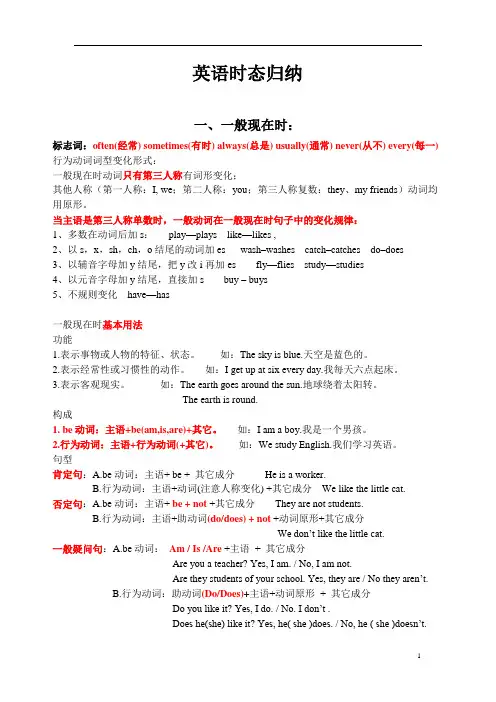
英语时态归纳一、一般现在时:标志词:often(经常) sometimes(有时) always(总是) usually(通常) never(从不) every(每一)行为动词词型变化形式:一般现在时动词只有第三人称有词形变化;其他人称(第一人称:I, we;第二人称:you;第三人称复数:they、my friends)动词均用原形。
当主语是第三人称单数时,一般动词在一般现在时句子中的变化规律:1、多数在动词后加s:play—plays like—likes ,2、以s,x,sh,ch,o结尾的动词加es wash–washes catch–catches do–does3、以辅音字母加y结尾,把y改i再加es fly—flies study—studies4、以元音字母加y结尾,直接加s buy – buys5、不规则变化have—has一般现在时基本用法功能1.表示事物或人物的特征、状态。
如:The sky is blue.天空是蓝色的。
2.表示经常性或习惯性的动作。
如:I get up at six every day.我每天六点起床。
3.表示客观现实。
如:The earth goes around the sun.地球绕着太阳转。
The earth is round.构成1. be动词:主语+be(am,is,are)+其它。
如:I am a boy.我是一个男孩。
2.行为动词:主语+行为动词(+其它)。
如:We study English.我们学习英语。
句型肯定句:A.be动词:主语+ be + 其它成分He is a worker.B.行为动词:主语+动词(注意人称变化) +其它成分We like the little cat.否定句:A.be动词:主语+ be + not+其它成分They are not students.B.行为动词:主语+助动词(do/does) + not+动词原形+其它成分We don’t like the little cat.一般疑问句:A.be动词:Am / Is /Are +主语+ 其它成分Are you a teacher? Yes, I am. / No, I am not.Are they students of your school. Yes, they are / No they aren’t.B.行为动词:助动词(Do/Does)+主语+动词原形+ 其它成分Do you like it? Yes, I do. / No. I don’t .Does he(she) like it? Yes, he( she )does. / No, he ( she )doesn’t.特殊疑问句:疑问词+ 一般疑问句A.be动词:How many students are there in your school?B.行为动词:What do you usually do on Sunday?一般现在时动词be和have的变化形式1.动词Be 叫连系动词, 用法:第一人称单数用am,第三人称单数用is,其它人称用are。
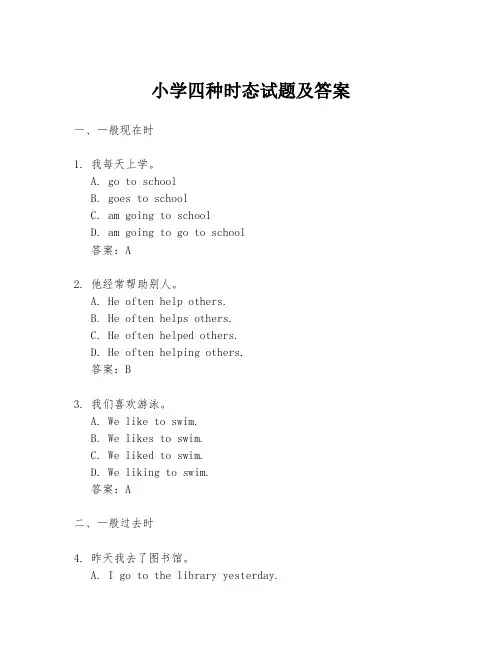
小学四种时态试题及答案一、一般现在时1. 我每天上学。
A. go to schoolB. goes to schoolC. am going to schoolD. am going to go to school答案:A2. 他经常帮助别人。
A. He often help others.B. He often helps others.C. He often helped others.D. He often helping others.答案:B3. 我们喜欢游泳。
A. We like to swim.B. We likes to swim.C. We liked to swim.D. We liking to swim.答案:A二、一般过去时4. 昨天我去了图书馆。
A. I go to the library yesterday.B. I went to the library yesterday.C. I am going to the library yesterday.D. I go to the library yesterday.答案:B5. 他们上周看了电影。
A. They watch a movie last week.B. They watched a movie last week.C. They are watching a movie last week.D. They will watch a movie last week.答案:B6. 她昨天买了一本书。
A. She buy a book yesterday.B. She bought a book yesterday.C. She is buying a book yesterday.D. She will buy a book yesterday.答案:B三、一般将来时7. 明天我要去看医生。
A. I am going to see a doctor tomorrow.B. I go to see a doctor tomorrow.C. I went to see a doctor tomorrow.D. I will go to see a doctor tomorrow.答案:A8. 他们将要参加比赛。
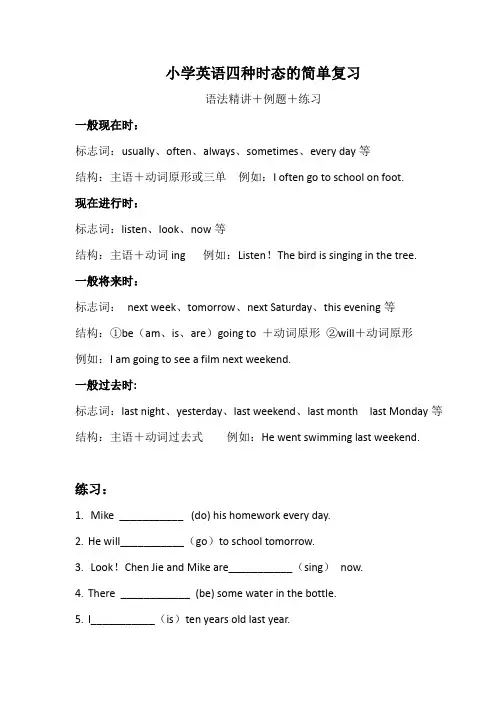
小学英语四种时态的简单复习语法精讲+例题+练习一般现在时:标志词:usually、often、always、sometimes、every day等结构:主语+动词原形或三单例如:I often go to school on foot.现在进行时:标志词:listen、look、now等结构:主语+动词ing 例如:Listen!The bird is singing in the tree.一般将来时:标志词:next week、tomorrow、next Saturday、this evening等结构:①be(am、is、are)going to +动词原形②will+动词原形例如:I am going to see a film next weekend.一般过去时:标志词:last night、yesterday、last weekend、last month last Monday等结构:主语+动词过去式例如:He went swimming last weekend.练习:1. Mike ___________ (do) his homework every day.2.He will___________(go)to school tomorrow.3. Look!Chen Jie and Mike are___________(sing)now.4.There ____________ (be) some water in the bottle.5.I___________(is)ten years old last year.6. We like ____________ (play) basketball after class.7.He___________(ride)a bike with his friend next week.8.My brother is___________(make)kites.9.They___________(do)their homework yesterday.10.We___________(take)a trip over the summer holiday.11. I like singing. I often ____________ (listen) to the music in the evening.12. My grandma ___________ (watch) TV every day.13.Mike didn’t___________(see)a film last night.14.What______you ______ ______ ______ (do)next Saturday.15.Is he___________(watch)TV ?Yes,they are.。

小学的四大时态知识点总结小学英语教学中,时态是学生必须掌握的基本语法点之一。
以下是小学阶段学生需要掌握的四大时态知识点的总结:1. 一般现在时(Simple Present Tense)- 用法:表示经常发生的动作或状态,或者表示客观事实。
- 结构:主语 + 动词原形/动词的第三人称单数形式(如:He/She/It + 动词-s/-es)。
- 例句:She goes to school every day.(她每天去上学。
)2. 现在进行时(Present Continuous Tense)- 用法:表示正在进行或发生的动作。
- 结构:主语 + be动词(am/is/are)+ 动词的现在分词形式(-ing)。
- 例句:They are playing football now.(他们现在正在踢足球。
)3. 一般过去时(Simple Past Tense)- 用法:表示过去发生的动作或状态。
- 结构:主语 + 动词的过去式。
- 例句:He visited his grandparents last week.(他上周拜访了他的祖父母。
)4. 一般将来时(Simple Future Tense)- 用法:表示将来发生的动作或状态。
- 结构:主语 + will + 动词原形;或主语 + be going to + 动词原形。
- 例句:She will go to the library tomorrow.(她明天将去图书馆。
)掌握这些基本时态对于小学生来说至关重要,它们是构建句子和表达思想的基础。
在学习过程中,学生应该通过大量的练习和实际应用来加深对这些时态的理解和运用。
同时,老师和家长也应该鼓励学生在日常生活中使用英语,以提高他们的语言能力。
通过不断的练习和应用,学生将能够更加熟练地掌握这些时态,并在英语交流中更加自信。
小学英语四大时态总结及练习题1. 简单现在时(Simple Present Tense)用法:表示现在正在进行的事情,或者经常性、习惯性的动作或状态。
构成:主语+ 动词原形+ 其他肯定句:I play basketball every day.否定句:I don't play basketball every day.一般疑问句:Do you play basketball every day?练习题:1. The sun (rise) in the east.2. We (love) our parents very much.3. (Do) you like to eat ice cream?4. Tom (not like) to go to school.5. They (visit) Beijing last year.2. 简单过去时(Simple Past Tense)用法:表示在过去某个时间点已经结束的动作或状态。
构成:主语+ 动词过去式+ 其他肯定句:I played basketball yesterday.否定句:I didn't play basketball yesterday.一般疑问句:Did you play basketball yesterday?练习题:1. Mary (go) to the park yesterday.2. We (have) a party last night.3. (Did) you see the movie yesterday?4. Lucy (not want) to go to the zoo last week.5. They (visit) their grandparents last weekend.3. 现在进行时(Present Continuous Tense)用法:表示正在进行的动作。
构成:主语+ be动词(am, is, are)+ 动词ing + 其他肯定句:I am playing basketball now.否定句:I am not playing basketball now.一般疑问句:Are you playing basketball now?练习题:1. My sister (watch) TV at the moment.2. We (not study) English now.3. (Is) he swimming in the river?4. Lucy (not listen) to music now.5. They (play) volleyball in the park.4. 将来时(Future Tense)用法:表示将要发生的动作或状态。
小学英语四种时态知识点加练习一、一般现在时一. 意义:表示经常发生的事情;动作或存在的状态二. 构成及变化1.be动词的变化..肯定句:主语+beam;is;are+其它..如:I am a boy.我是一个男孩..否定句:主语+ be + not +其它..如:He is not a worker.他不是工人..一般疑问句:Be +主语+其它.. 如:-Are you a student -Yes. I am. / No; I'm not. 特殊疑问句:疑问词+一般疑问句..如:Where is my bike2. 行为动词的变化..l、当主语为第一;二人称及复数时;助动词为do肯定句:主语+动词原形+其它..如:We often play basketball after school.否定句:主语+ don't+动词原形+其它..如:we don’t play basketball after school.一般疑问句:Do +主语+动词原形+其它如: Do you often play basketball after school Yes; we do. / No; we don't.特殊疑问句:疑问词+以do开头的一般疑问句如: What do you often do after school2、当主语为第三人称单数时 ;助动词为does肯定句:主语+动词三单式+其它..如: He swims well.否定句:主语+ doesn’t+动词原形+其它..如:He doesn’t swim well..一般疑问句:Does +主语+动词原形+其它..如:Does he swim wellYes; he does. / No; he doesn't.特殊疑问句:疑问词+以does开头的一般疑问句如: How does your father go to work三.第三人称单数的动词变化规则只有在第三人称为主语的肯定句中;动词才用三单式1多数动词直接加s: runs gets likes collets takes plays climbs…….2结尾是s; x; sh; ch; o;前为辅音字母; 结尾加es : watches teaches goes does washes crosses mixes brushes3动词末尾y前为辅音:将y改为i加es: study→studies fly→flies carry→carries cry→cries但在y前如果为元音则直接加s: buys says四.时间标志:always ; usually ; often ; sometimes ;every…一般现在时练习题I.用下列单词的适当形式填空1.We often___________play in the playground.2.He _________get up at si x o’clock.3.__________you _________brush your teeth every morning4.What________________do he usually________________do after school5.Danny ________________study English; Chinese; maths; science and Art at school.6.Mike sometimes __________go to the park with his sister.7.At eight at night; she __________watch TV with his parents.8.________ Mike________read English every day9.How many lessons_________your classmates________have on Monday10.What time_________his mother_________do the houseworkII.改句子1.Do you often play football after school 改为肯定句2.I have many books.改为否定句3.Gao Shan’s sister likes playing table tennis 改为否定句4.She lives in a small town near New York.改为一般疑问句5.I watch TV every day.改为一般疑问句6.We have four lessons.改为否定句7.Nancy doe sn’t run fast 改为肯定句二、现在进行时一、概念现在进行时表示说话时正在进行或发生的动作;也可表示当前一段时间内的活动或现阶段正在进行的动作..结构:be动词 am / is / are + doing二、现在分词的构成:1.大多数动词后可在动词后直接加-ing.Eg: carry-carrying;catch-catching;drink-drinking; enjoy-enjoying hurry-hurrying ;do-doing ; read-reading ; think-thinking2. 如果动词以-e结尾;则去掉-e;再加-ing;如come-coming ; have-having ; make-making;ride-riding;write-writing;take-taking;use-using.3. 如果动词只有一个元音字母;而其后跟有一个辅音字母时;将此辅音字母双写;再加-ing 如:hit-hitting;let-letting; put-putting;run-running;sit-sitting.4. 如果动词有两个音节;且重音在第二个音节上;则末尾的辅音字母须双写;再加-ing; 如: forget-forgetting;prefer-preferring;upset-upsetting.试比较benefit/benfiting;differ/differing;profit/profiting;这些词的重音在第一个音节上;因此其末尾的辅音字母不双写.5. 以-ic 结尾的动词;应先把-ic 变为-ick;再加-ing;eg: panic/panicking;picnic/picnicking;但 lie/lying ;die/dying;tie/tying是特殊变化要记住.三、句型结构:1.现在进行时的肯定形式、否定形式、疑问形式及其回答;所有变化都体现在助动词 be is / am / are 上.1现在进行时的肯定形式:主语+beam/ is/are+doing+其他成分I am singing . They are writing .2现在进行时的否定形式:主语+beam/ is/are+not +doing+其他成分I am not singing . They aren’t writing .3一般疑问句及回答:beam/ is/are+ 主语+doing+其他成分Am I singing Yes ;you are . / No ;you aren’t .Are they writing Yes ;they are . / No ;they aren’t .4特殊疑问句及回答:特殊疑问词+beam/ is/are+主语+doing+其他成分What are you doing We are playing 要求就提问内容具体回答.2. 缩写形式如下:I am---I’m You are---You’re He is---He’s She is---She’sIt is---It’s We are---We’re They are---They’re3.说明: 不是所有动词都能用现在进行时态的;如:see、like、want、know 等动词往往都不用进行时态.四.用法:1.表示现在指说话人说话时正在发生的事情.往往与 now;at the moment;at present;just now;listenlook等副词连用;以示强调.We are waiting for you. What are you doing Some one’s knocking at the door.2.正在进行着的动作可视为未完成的动作:He’s talking to his friends in the classroom.可用still 一词强调动作的持续性He’s still talking to his friends in the classroom.3. 表示长期的或重复性的动作;说话时动作未必正在进行.Mr. Black is writing another article.Don’t take that book away. Your father’s using it.She is learning piano under Mr. Black.4.现在进行时可用来表示不会长期发生的动作或情况;或被认为在短期内正在进行的动作或存在的情况:What’s your brother doing these days He’s studying English at Oxford University.5.现在进行时也可以用来表示当前的动向:People are becoming more and more beautiful these days.6. 表示渐变的动词有:become;turn;get;grow;run;go;begin等.The leaves are turning brown.It’s getting colder and colder.7.与always;constantly;forever 等词连用;表示反复发生的动作或持续存在的状态;往往带有说话人的主观色彩.You are always changing your mind.8. 现在进行时表将来现在进行时以及 be going to可以表示为将来安排好的活动和事件We’re spending next winter in China. 用arrive;come;go;leave 等动词的现在进行时描写行程安排;也通常有“将到达”和“将离去”的意思:He’s arriving tomorrow morning.9.当现在进行时表示某事发生的次数过多时;则有时含有抱怨;讨厌;赞扬等的意思:He is al ways singing at night;and we can’t fall asleep late at night.现在进行时练习题一.用现在进行时完成下列句子:1. ______you__________fly a kite Yes;_______.2. ______you___________sit in the boat3. ______he_____________talk with me4. We_______________play football now.5. What_________you__________do6. I_____________sing an English song.7. What________he____________mend8. He______________mend a car.9. These boys _________ play tennis on the playground.10. My mother______________ cook in the kitchen.11. We can’t help you;because we ____________ have classes.12. ________ the boy ___________ write his homework13. Look These butterflies _________ fly in the sky.14. Listen The girl ___________ sing in the next room.15. The naughty boy __________ swim in the river.二.选择1. Look. Lucy is_____ a new bike today.A. jumpingB. runningC. riding D takeing2. The children _____ football.A. is playingB. are playingC. play theD. play a3. They ______TV in the evening. They do their homework.A. are watchingB. can’t watchingC. don’t watchD. don’t watching4. Listen She____ in the classroom.A. is singingB. sing C .to sing D. is sing5. ______are you eating I’m eating ______ meat.A. What;someB. Which;anyC. Where;notD. What;a6. Is she ____ somethingA. eatB. eatingC. eattingD. eats7.My dictionary ___;I have looked for it everywhere but still___ it.A. has lost;don’t findB. is missing;don’t findC. has lost;haven’t foundD. ismissing;haven’t found.8..Having a computer for personal use is no easy task because technology _______ sorapidly.A. is changingB. has changedC. will have changedD. will change9. The building_______ ;I can’t stand the noise.A. was being builtB. is builtC. is being builtD. builds10. I can’t catch up with the fashion;b ecause the clothes style_______ all the time.A. has changedB. is changedC. is changingD. changed一般将来时一、概念:表示将要发生的动作或存在的状态及打算、计划或准备做某事..句中一般有以下时间状语:tomorrow; next dayweek; month; year…;soon; the day after tomorrow后天等..二、基本结构:①be going to + do;②will+ do.三、否定句:在be动词am; is; are后加not或情态动词will后加not成won’t..例如:I’m going to have a picnic this afternoon.→ I’m not going to have a picnic this afternoon.四、一般疑问句: be或will提到句首;some改为any; and改为or;第一二人称互换..例如:We are going to go on an outing this weekend. → Are you going to go on an outing this weekend五、对划线部分提问..一般情况;一般将来时的对划线部分有三种情况..1. 问人..Who 例如:I’m going to New York soon. →Who’s going to New York soon.2. 问干什么..What … do.例如: My father is going to watch a race with me this afternoon. →What is your father going to do with you this afternoon.3. 问什么时候..When.例如:She’s going to go to bed at nine. →When is she going to bed六、同义句:be going to = willI am going to go swimming tomorrow明天. = I will go swimming tomorrow.一般将来时练习题1. 我打算明天和朋友去野炊..I_____ _______ _________ have a picnic with my friends.I ________ have a picnic with my friends.2. 下个星期一你打算去干嘛我想去打篮球..What ________ ________ _________ _________ _________ next Monday I _______ ______ _____ play basketball.What _________ you do next Monday I ________ play basketball.3. 你妈妈这个周末去购物吗是;她要去买一些水果.._____ your mother _______ ________ go shopping this ___________Yes; she _________. She ______ ________ __________ buy some fruit.4. 你们打算什么时候见面..What time _______ you _________ __________ meet改句子..5. Nancy is going to go camping.改否定Nancy ________ going to go camping.6. I’ll go and join them.改否定I _______ go ______ join them.7. I’m going to get up at 6:30 tomorrow.改一般疑问句________ _______ ________ to get up at 6:30 tomorrow8. We will meet at the bus stop at 10:30.改一般疑问句_______ ________ meet at the bus stop at 10:30.9. She is going to listen to music after school.对划线部分提问________ _______ she ________ ________ _________ after school10. My father and mother are going to see a play the day after tomorrow.同上_________ _________ going to see a play the day after tomorrow.用所给词的适当形式填空..11. Today is a sunny day. We ___________________ have a picnic this afternoon.12. My brother _______________ go to Shanghai next week.13. Tom often ______________go to school on foot. But today is rain. He ______________ go to school by bike.14. What do you usually do at weekends I usually __________ watch TV and ____________catch insects.15. It’s Friday today. What _____she _________ do this weekend She ______________ watch TV and _____________ catch insects.一般过去时I. 一般过去时的概念一般过去时表示过去某个时间发生的动作或存在的状态..常和表示过去的时间状语连用..如:last year/week/night/month; yesterday等..例如:①I saw him in the street yesterday. 昨天我在街上看见他了..②Li Mei always went to school on foot last year. 去年李梅总是步行上学..II. 一般过去时的构成动词过去式的构成:1规则动词过去式的构成有四条规则:①一般在动词原形末尾直接加上-ed..如:look-looked..②以不发音的字母e结尾的动词;去e再加-ed..如:live-lived..③末尾只有一个辅音字母的重读闭音节;先双写这个辅音字母;再加-ed..如:stop-stopped..④末尾是辅音字母+y结尾的动词;先变y为i;然后再加-ed..如:study-studied..2不规则动词的过去式需特殊记忆..amis-was; are-were; go-went; come-came; take-took; have has-hadread-read; make-made; see-saw; go-went; eat-ate;III. 一般过去时的几种句型肯定句结构为:主语+动词的过去式+其它..如:He went to the toy store yesterday. 他昨天去玩具店了..否定句结构为:主语+did not didn't+动词原形+其它..如:He didn't go to the toy store yesterday. 他昨天没去玩具店..一般疑问句的构成:Did+主语+动词原形+其它如:1 -Did you go to Beijing last week -Yes; we did. No; we didn't.2 -Did you meet the businessman before -No; I didn't. Yes; I did.特殊疑问句的构成:疑问词+did+主语+动词原形+其它如:1 -What did you do last night -I did my homework.2 -Where did you go last week -I went to Shanghai with my parents.小学阶段要掌握的几个动词的过去式:watched TV; washed clothes; played football; cleaned the room;visited grandparents; went to a park; went swimming; read a book; went fishing; went hiking; learned Chinese; sang and danced; took pictures; climbed a mountain; ate good food; bought presents; roweda boat; saw elephants; went skiing; went ice-skating.一般过去时练习题I.用所给的动词的适当形式填空..⒈He __visited____visit the Great Wall last year.2.We____had___have a good time yesterday.3.We often ____went__go to school by bus last year.4.I __lived__livein the village when I was a child.5.Mike__saw__see a big tiger in the nature park last year.6.Sam____did___ do the housework yesterday.7.___Did_do you ___enjoy__enjoy yourself yesterday8.-__Did__doyou ___play__play the violin in the afternoon yesterday-No; I didn't. I___drew___drawsome pictures there.9.. I ___ate___ eat a big pizza yesterday.10.There__were_____ be many sheep on the farm last year.II.选择填空1. She watered the flowers ________.A tomorrowB sometimesC yesterday morning2.What ____ Mike do last weekendA doB doesC did3. I ___ my room last Sunday.A cleanedB cleanC am cleaning4. I often help my mother _____ housework.A doesB didC do5. _____ you _____ TV last night .A Do; watchB Did; watchC Did; watched6.---Did your father write an e-mail yesterdayA Yes; he did.B Yes; he doesC No; he don’t7.They _____ on a trip in February ;2007.A are goingB goingC went8.We’re going to _____ mountains tomorrow .A climbB climbedC climbingIII.根据句意;填上合适的单词..1.-Where you go on your holiday - I a park. 2.- did you do on your holiday - I presents.3.- did you go there I I went plane.4.- What did you learned ;learn last Monday5.- Did you a boat yesterday课后练习一、写出下列动词的第三人称单数drink ________ go _______ stay ________ make ________look _________ have_______ pass_______ carry ____come________ watch______ plant_______ fly ________study_______ brush________ do_________ teach_______二、写出下列动词的现在分词play________ run__________ swim _________make__________go_________ like________ write________ ski___________ read________ have_________ sing________ dance_________put_________ see________ buy _________ love____________live_______ take_________ come ________ get_________stop_________ sit ________ begin________ shop___________三、写出下列动词的过去式is\am_________ fly_______ plant________ are ________drink_________ play_______ go________ make ________does_________ dance________ worry________ ask _____taste_________ eat__________ draw________ put ______throw________ kick_________ pass_______ do ________四、用行为动词的适当形式填空1. He _________ live in Wuxi two years ago.2. The cat ________ eat a bird last night.3. We _______ have a party last Halloween.4. Nancy ________ pick up oranges on the farm last week.5. I ________ make a model ship with Mike yesterday.6. They ________ play chess in the classroom last PE lesson.7. My mother _______ cook a nice food last Spring Festival.8. The girls ________ sing and _______ dance at the party.9. She and I ________take a walk together every evening.10. There ________be some water in the bottle.11. Today is a sunny day. We ___________________ have a picnic this afternoon.12. My brother _______________ go to Shanghai next week.13. Tom often ___________go to school on foot. But today is rain. He ___________ go to school by bike.14. What do you usually do at weekends I usually __________ watch TV and ____________catch insects15. It’s Friday today. What _____she _________ do this weekend She ______________ watch TV and _____________ catch insects.16. She _______go to school from Monday to Friday.17. Liu Tao _______do not like PE.18. The child often _______watch TV in the evening.19. Su Hai and Su Yang _______have eight lessons this term.20. -What day _______be it today-It’s Saturday.21.The boy __________________ drawa picture now.22. Listen .Some girls _______________ singin the classroom .23. My mother _________________ cook some nice food now.24. What _____ you ______ do now25. Look . They _______________ have an English lesson .26.They ____________not ;water the flowers now.27.Look the girls ________________dance in the classroom .28.What is our granddaughter doing She _________listen to music.29. It’s 5 o’clock now. We _____________havesupper now30.______Helen____________wash clothes Yes ;she is .31. It _____ be the 2nd of November yesterday. Mr White ________ go to his office by car.32. Gao Shan ________ put the book on his head a moment ago.33. Don’t ______ the house. Mum _______ it yesterday. clean34. What ____ you ______ just now I _______ some housework. do35. They _________ make a kite a week ago.36. I want to ______ apples. But my dad _______ all of them last month. pick37. _______ he ______ the flowers this morning Yes; he _____. water38. She ____ be a pretty girl. Look; she _____ do Chinese dances.39. The students often _________ draw some pictures in the art room.40.What ______ Mike do on the farm He ________ cows. milk五、用be动词的适当形式填空1. I ______ watch a cartoon on Saturday.2. Her father _______ read a newspaper last night.3. We _________ to zoo yesterday; we _____ to the park. go4. ______ you _______ visit your relatives last Spring Festival5. ______ he _______ fly a kite on Sunday Yes; he ______.6. Gao Shan _______ pull up carrots last National Day holiday.7. I ____________ sweep the floor yesterday; but my mother ______.8. What ______ she _______ find in the garden last morning She __________ find a beautiful butterfly.六、句型转换1. Su Hai took some photos at the Sports day.否定句:________________________________________________一般疑问句:____________________________________________肯、否定回答:__________________________________________2. Nancy went to school early.否定句:________________________________________________一般疑问句:____________________________________________肯、否定回答:__________________________________________3.He is playing the football in the playground .对划线部分进行提问_________________________________________________________________4.Tom is reading books in his study . 对划线部分进行提问_________________________________________________________________5. It was exciting.否定句:________________________________________________一般疑问句:____________________________________________ 肯、否定回答:__________________________________________七、按照要求改写句子1. Daniel watches TV every evening.改为否定句___________________________________________________2. I do my homework every day.改为一般疑问句;作否定回答____________________________________________________________________________________3. She likes milk.改为一般疑问句;作肯定回答___________________________________________________________________________________4. Amy likes playing computer games.改为一般疑问句;作否定回答____________________________________________________________________________________________5. We go to school every morning.改为否定句_______________________________________________________6. He speaks English very well.改为否定句___________________________________________________7. I like taking photos in the park.对划线部分提问________________________________________________________ 8. John comes from Canada.对划线部分提问___________________________________________________9. She is always a good student.改为一般疑问句;作否定回答________________________________________________________________________________________10. Simon and Daniel like going skating.改为否定句___________________________________________________八、改错划出错误的地方;将正确的写在横线上1. Is your brother speak English __________________2. Does he likes going fishing __________________3. He likes play games after class. __________________4. Mr. Wu teachs us English. __________________5. She don’t do her homework on Sundays. _________________九、填空1. 我打算明天和朋友去野炊..I_____ _______ _________ have a picnic with my friends.I ________ have a picnic with my friends.2. 下个星期一你打算去干嘛我想去打篮球..What ________ ________ _________ _________ _________ next MondayI _______ ______ _____ play basketball./ What _________ you do next MondayI ________ play basketball.3. 你妈妈这个周末去购物吗是;她要去买一些水果.._____ your mother _______ ________ go shopping this ___________Yes; she _________. She ______ ________ __________ buy some fruit.4. 你们打算什么时候见面..What time _______ you _________ __________ meet。
小学四种时态练习训练在小学英语研究中,掌握时态是非常重要的一部分。
正确使用不同的时态能够帮助学生准确表达过去、现在和将来的事件。
以下是一些小学生可以进行的四种时态练训练。
一、一般现在时(Simple Present)这是最基本的时态,用于描述经常发生的事件或现实情况。
以下是一些练活动建议:- 写出你的日常活动。
例如:I play football every Saturday.(我每个星期六打足球。
)- 制作问卷调查,询问同学们的日常活动。
例如:Do you liketo read books?(你喜欢读书吗?)二、一般过去时(Simple Past)这一时态用于描述过去的事件或经历。
以下是一些练活动建议:- 描述你的昨天。
例如:Yesterday, I went to the park with my friends.(昨天,我和朋友们去了公园。
)- 编写一个小故事,描述过去发生的事情。
例如:Once upon a time, there was a little girl named Lucy. She lived in a small village.(从前,有一个叫露西的小女孩。
她住在一个小村庄。
)三、一般将来时(Simple Future)这一时态用于描述将要发生的事件或计划。
以下是一些练活动建议:- 写下你的未来计划。
例如:I will go to the beach next summer.(下个夏天我将去海边。
)- 制定一个研究计划,列出你明天要做的事情。
例如:Tomorrow, I will study English and do my homework.(明天,我将研究英语并完成我的作业。
)四、现在进行时(Present Continuous)这一时态用于描述正在进行的事件或动作。
以下是一些练活动建议:- 描述你现在正在做的事情。
例如:I am reading a book right now.(我现在正在读书。
完整版)小学四大时态的综合练习基础知识概念结构、时间状语、否定和一般疑问句在英语语法中,有一些基础知识是必须掌握的,包括概念结构、时间状语、否定和一般疑问句等。
其中,概念结构是指一个句子中的各个成分之间的关系;时间状语则是表示时间的词语,如ago、yesterday、the day before yesterday、last week 等;否定形式包括主语+am/is/are+not以及主语+don't/doesn't+动词原形等;一般疑问句则是以am/is/are或do/does开头的问句,如Am/Is/Are+主语+。
或Do/Does+主语+。
表示过去某个时间在表示过去某个时间的时候,我们可以使用was/were来表示过去发生的动作或者状态,也可以使用had来表示过去的惯性动作或状态。
例如,我们可以说yesterday I was very busy,表示昨天我非常忙碌;又如,when I was young。
I had a lot of friends,表示在我年轻的时候,我有很多朋友。
表示经常、反复发生的动作或行为如果我们想要表达经常、反复发生的动作或行为,可以使用is/am/are+动词原形/动词的第三人称单数形式,或者使用often、usually、always、never、sometimes、every week、oncea week、on Sundays等时间状语。
例如,I usually go to bed at11 o'clock,表示我通常在11点钟睡觉;又如,she is always late for class,表示她上课总是迟到。
表示现况和性质在表示现况和性质的时候,我们可以使用have/has+动词原形+一段时间(如week/year/month/night)、in 1989、just now、at the age of twelve、one day、long long ago等时间状语。
四种时态的重点掌握内容一般现在时:主体构成:主语+be+名词/形容词主语+动词动词变化:一般词尾+S,sh/ch/s/x尾+es,辅音字母+Y尾把Y变i+es,辅音字母+o结+es.标志词:usually, often, sometimes ,always, never,every morning/night/evening/day/week,现在进行时:主体构成:主语+be+动词ing 标志性词语:look now listening形式变化:①直接+ing ②去掉e+ing③双写最后一个字母+ing get sit shop swim run一般将来时:主体构成:主语+be+going+动词原形标志性词语:tomorrow , tomorrow morning / afternoon, this morning/afternoon, next year /month, from now on (从现在开始),in an hour (一小时后),一般过去时:主体构成:主语+was/were+名词/形容词主语+动词过去式动词过去式形式变化:(1)一般在动词尾加ed。
(2)以不发音的e结尾的动词,直接加d。
(3)以“辅音字母+y“结尾的动词,变y为i再加ed。
(4)重读闭音节一个辅音字母结尾,双写词尾辅音字母再加ed。
发音规则: a. 以元音或浊辅音结尾的动词。
加— ed后,— ed发音浊辅音[d]。
b. 以清辅音结尾的动词,加— ed后,— ed发清辅音[t] 。
c. 以[t] [d]结尾动词加ed,ed发[id],与结尾的[t]、[d]相拼,读作[tid]或[did]. 标志性词语:last, just now, yesterday, …ago现在进行时一、用括号中动词的适当形式填空:1. My parents _______(watch)TV now.2. Look. Three boys _______(run).3. What _____ your mother _______(do)now?4. _______ your dog _______ now?(sleep)5. _____ you ______(listen)to music? Yes, I am.6. Look, Miss Chen _______ football.(play)7. Tom and his sister ____(wait)for you.8. Now Class 3 and Class 4______(have)a test.9. Listen, someone _____(sing)in the room. 10. She _____(talk)with May in the teacher’s office.二、选择填空:( )1. Who ______ over there now? A. singing B. are sing C. is singing( )2. It’s nine ten. The students _____ a music class. A. have B. having C. are having ( )3. Listen! The boy _______. A. crying B. is crying C. cries( )4. Do n’t talk here. Grandparents ______. A. sleep B. is sleeping C. are sleeping ( )5. Is the man _______ tea or milk? A. drinks B. drink C. drinking( )6. Look, they are _______in the river. (A) swimming (B) swim (C) swims( )7. _____friend's making ______ a kite. (A)I,me (B)My,my (C)My,me (D)His,his ( )8. Is the woman __ yellow your teacher?(A)in (B)putting on (C)wearing (D)having ( )9. Look! The twins_____ doing the housework.(A)are (B)is (C) am (D) do( )10. Look.Lucy _____a new bike today. (A) riding (B)is rideing (C) is riding ( )11. Is she ____ something? (A) eat (B) eating (C) eatting (D)eats( )12. The children____football. (A)is playing (B)are playing (C)play the (D)play a ( )13. They ____ TV in the evening. (A)are watching (B)can't watching (C)don't watch ( )14. They are _____ their clothes.(A)makeing (B)putting (C)put away (D)putting on ( ) 15. Listen! She ____ in the classroom. (A)is singing (B)sing (C)to sing (D)is sing三、按要求进行句型转换:1.Look! Lily is dancing.(改一般疑问句)_________________________________________2. Kate is looking for her watch.(改否定句)________________________________________3. Mrs. White is watching TV.(划线提问)_________________________________________4. I am doing homework.(改否定句)__________________________________________5. They are waiting for you at the library.(划线提问)_____________________________一般将来时一、选择题( ) 1.There ____ a meeting tomorrow. A. is going to be B. will go to be( )2.Charlie___here next month. A. won’t work B. working C. isn’t going to working( )3. He ___ busy this week A. will be B. is; C. will be; D. is( )4.There ____a football match tomorrow. A. was B. is going to have C. will have( )5. ____ you ___ free tomorrow? Are; going to B. Are; going to be C. Are; going to( )6. Mother ___ me a present on my next birthday. A. will gives B. will give C. gives ( )7. He _____ her a hat on her next birthday. A. gives B. will giving D. is going to give ( )8. He _____ to us as soon as he gets there. A. writes B. has written C. will write( )9. He _____ in three days. A. came back B. will come back C. is going to coming back ( )10.We ____the work this way next time. A. do B. will do C. going to do D. will doing ( )11.Tomorrow he ____a kite in the park. A. will flys; B. will flying C. is going to fly;( )12.tomorrow they ___a volleyball match. A. will watching B. watches C. is watching ( )13.They _____ a party tomorrow. A.are having B.are going to have C.will having ( )14. ___ you ____free next Sunday? A. Will; are B. Will; be C. Do; be D. Are; be ( )15. He ________ there at ten tomorrow morning. A. will B. is C. will be D. be二句型转换1. Nancy is going to go camping.(改否定)Nancy ________ going to go camping.2. I’ll go and join them.(改否定)I _______ go ______ join them.3. I’m going to get up at 6:30 tomorrow.(改一般疑问句)________ _______ ________ to get up at 6:30 tomorrow?4. We will meet at the bus stop at 10:30.(改一般疑问句)_______ ________ meet at the bus stop at 10:30.5. She is going to listen to music after school.(对划线部分提问)________ _______ she ________ ________ _________ after school?6. My father and mother are going to see a play the day after tomorrow.(同上)_________ _________ going to see a play the day after tomorrow.7. Today is a sunny day. We _______ (have) a picnic this afternoon.8. My brother _____(go) to Shanghai next week.9. Tom often _____ (go) to school on foot. But today is rain. He ______(go) to school by bike.10. What do you usually do at weekends? I usually____(watch) TV and ______(catch) insects?11. What ________(do) you do last Sunday? What _______(do) next Sunday?12. Mary _____ (visit) her grandparents tomorrow一般现在时一. 用所给动词的适当形式填空:1.Mike__________ (like) cooking. 2. She__________ (go) to school from Monday to Friday.3. He often_______ (have) dinner at home.4. Daniel and Tommy _______ (be) in Class One.5. There_____ (be) some water in the bottle.6. Don’t make a noise. Grandpa __________(sleep).7. It’s seven now, Tom’s family__________(watch) TV.8. It ________(take) me two hours to finish my homework last night.9. She often_______(wash) clothes in the evening.10. She______ (don’t do) homework every day. 11. The girl______ (teach) English on Sundays.12. There ________ (be) a football match on TV this evening.13. Your parents__________ (read) newspapers every day.14. What they often__________ (do) on Saturdays? 15. We ______ (not watch) TV on Monday.16. they__________ (like) the World Cup. 17. Nick________ (not go) to the zoo on Sunday.18. Liu Tao__________ (do) not like PE.19. Jenny and Danny usually______(play) games in the afternoon .二.单项选择:1. Jenny____ English every evening. A has study B studies C study D studied2. Wang Mei ____ music and often ____ to music. A like; listen B likes; listens C like; are listening D liking ; listen3. The picture _______ nice. A. looks B. is looked C. look D. is looking4. He ______ a good friend. A. having B. have C. to have D. has5. One of the boys_____ a black hat. A have B there is C there are D has三、按照要求改写句子1. Daniel watches TV every evening.(改否定句) ______________________________________2. I do my homework every day.(改一般疑问句) ________________________________3. She likes milk.(改为一般疑问句) ____________________________________________4. Amy likes playing computer games.(改一般疑问句)________________________________5. We go to school every morning.(改否定句)_____________________________________6. He speaks English very well.(改否定句)________________________________________7. I like taking photos in the park.(划线提问)_________________________________________8. John comes from Canada.(划线提问)_____________________________________________9. She is a good student.(改一般疑问句否定回答)____________________________________10. Simon and Daniel like going skating.(否定句)___________________________________一般过去时一、用动词的适当形式填空。